Run-down of Competitive Governor's Races
Permalink
We looked at the competitive Senate races last week. Now let's look at the competitive governor's
races coming up in 2010. But keep in mind, the election is nearly a year away and a lot can change in
that time.
Arizona
| Incumbent | Challenge | Notes |

Jan
Brewer
(R)
|

Terry
Goddard
(D)
|
Gov. Jan Brewer (R-AZ) got her job when term-limited Gov. Janet Napolitano (D-AZ)
took a job in the cabinet. Since she wasn't elected, she may be vulnerable
to a primary challenge, possibly from Paradise Valley mayor Vernon Parker or
Maricopa County sheriff Joe Arpaio. The
most likely Democratic candidate is Attorney General Terry Goddard.
Since the most recent person to be elected governor was a Democrat in an
otherwise somewhat Republican state, this race has to be considered a
tossup at this point.
|
California
| Challenger | Challenger | Notes |

(R)
|
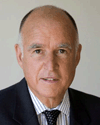
Jerry
Brown
(D)
|
Open seat. Gov. Arnold Schwarzenegger (R-CA) is term limited so the
biggest prize of all in terms of possibilities to gerrymander
House districts is up for grabs.
It looks like the Democrats are going to run former governor and current Attorney General Jerry Brown.
Brown's father, Pat Brown, was also a former governor.
On the Republican side,
the main candidates seem to be Meg Whitman, a former CEO of eBay and the
state insurance commissioner, Steve Poizner.
Both are billionaires. Also running is former congressman Tom Campbell (R),
but he will have a tough time outspending the billionaires.
Given the Democratic lean of
the state, any of these would be swimming upstream against any
Democrat, but especially against Brown, who is very well known in the state.
|
Colorado
| Incumbent | Challenger | Notes |

Bill
Ritter
(D)
|

Scott
McInnis
(R)
|
Gov. Bill Ritter (D-CO) will be going for his second term in this increasingly blue state.
His choice of Sen. Michael Bennet (D-CO) to replace Sen. Ken Salazar (D-CO) was bizarre at
best, especially considering there were plenty of Democratic members of the House eager for
the job. So far, former House member Scott McInnis seems like the most likely Republican in the race.
|
Connecticut
| Incumbent | Challenger | Notes |

(R)
|

(D)
|
With Gov. Jody Rell's announced retirement, this has become a wide open
race with the Democrats having a good chance to pick up the governor's
mansion. Secretary of State Susan Bysiewicz is probably going to run
and 2006 senatorial primary winner Ned Lamont might run too.
The Republican side is completely open.
|
Florida
| Challenger | Challenger | Notes |

Bill
McCollum
(R)
|

Alex
Sink
(D)
|
Open seat. With Gov. Charlie Crist's decision to run for the seat of retired senator Mel Martinez,
the governor's race was suddenly thrown wide open. Surprisingly, it settled down on
both sides very fast, with Attorney General Bill McCollum (R) and Chief Financial Office
Alex Sink (D) becoming the overwhelming favorites to get their party's respective
nominations. Both are well know statewide. It could be a close race.
|
Iowa
| Incumbent | Challenger | Notes |
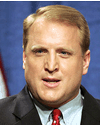
Chet
Culver
(D)
|

Terry
Brandstad
(R)
|
Gov. Chet Culver (D-IA) is a moderate Democrat in a moderately Democratic state.
However, his popularity is dropping and he could be vulnerable.
The most likely Republican is
former four-term governor Terry Branstad.
Since Branstad is a proven vote getter, albeit a decade ago, he could be a tough competitor.
|
Illinois
| Incumbent | Challenger | Notes |

Pat
Quinn
(D)
|

(R)
|
Gov. Pat Quinn (D-IL) became governor when his predecessor, Rod Blagojevich, was impeached and convicted.
So far, Quinn doesn't appear touched by the state's boundless corruption, but when
you weren't elected to your current office, you are always vulnerable.
He will probably face a primary with Comptroller Dan Hynes.
The Republicans don't have a stellar candidate here, with half a dozen poorly
known candidates slugging it out for the nomination. Former state Republican Party chairman Andy McKenna
might have a slight edge over the pack.
|
Maine
| Challenger | Challenger | Notes |

(D)
|

(R)
|
Open seat. Gov. John Baldacci (D-ME) is term limited, giving the Republicans
a shot in this once strongly Republican state. However, they don't have a
lot of potential candidates. While both senators are Republicans, it is
doubtful that either one wants the job. Both representatives are Democrats.
Most likely, a state legislator or rich businessman will get the
nomination. It may not be worth that much, however, since the the state
is quite blue and the only way senators Susan Collins and Olympia Snowe
stay in the saddle is by bucking their own party much of the time. A
possible Democratic candidate is Attorney General Steve Rowe, who is
definitely interested, but 20 other Democrats have filed to run as well.
One wild card is the possibility of an independent governor; two of the past
five governors have been independents.
|
Maryland
| Incumbent | Challenger | Notes |
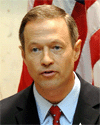
Martin
O'Malley
(D)
|

(R)
|
Gov. Martin O'Malley (D-MD) will be running for a second term in this very
blue state. Early in his term he raised taxes, which lowered his approval
ratings somewhat. If former one-term governor Bob Erlich (R) wants to get his
old job back, he might have a chance. Without Erlich, the likely GOP nominee will
probably be Larry Hogan, son of a former Republican congressman and he will lose badly.
|
Michigan
| Challenger | Challenger | Notes |

(D)
|

(R)
|
Open seat. Term-limited governor Jennifer Granholm (D-MI) is leaving, which is
probably a good thing for the Democrats as she was not all that popular. Also, the
economy of her state is a complete disaster, although it is not really her fault
that General Motors has had little interest in the past 30 years in producing cars that people
actually want to buy. Lt. Gov. John Cherry (D-MI) is next in line and may try to
grab the brass ring, however, Flint mayor Don Williamson (D) and state House Speaker
Andy Dillon (D) may challenge him in a primary. The Republicans have plenty of
possibles here, including Attorney General Mike Cox (R), Secretary of State Terri Land (R),
and quite a few members of Congress. Michigan definitely offers the Republicans
a good shot at a pickup.
|
Minnesota
| Challender | Challenger | Notes |

(R)
|

(D)
|
Open seat. Some people are talking about Gov. Tim Pawlenty (R-MN) as a possible
presidential nominee in 2012. He hasn't discouraged that kind of talk,
and he decided not to run for a third term in 2010 to concentrate on his presidential run.
The mayor of Minneapolis, R.T. Rybak (DFL) is running but there are likely
to be more candidates shortly.
The Republican field is fluid due to Pawlenty's unexpected withdrawal from the race.
Former senator Norm Coleman (R) might hop in.
|
Nevada
| Incumbent | Challenger | Notes |
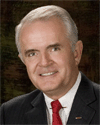
Jim
Gibbons
(R)
|

(D)
|
Gov. Jim Gibbons (R-NV) has been up to his ears in scandals since day 1, including a messy divorce in which
the state's first lady refused to move out of the governor's mansion. Then there were
shady land deals, a bribery investigation, illegal campaign donations, and more.
He will certainly be challenged in a primary, possibly by Attorney General Brian Sandoval.
The highest-profile Democrat running is Sen. Harry
Reid's son, Rory, but mayor of Sin City, Oscar Goodman, might challenge him. Or Goodman might
run as an independent. A lot depends on whether this is a two-way race (Democrat favored) or
a three-way race (Republican favored).
|
New York
| Incumbent | Challenger | Notes |
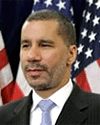
David
Paterson
(D)
|

(R)
|
Politics is a blood sport in New York. This time will be no exception.
Gov. David Paterson (D-NY) succeeded to the governor's mansion when
Eliot Spitzer resigned after being ensnared in a prostitution sting.
Paterson, the state's first black governor as well as the nation's first
blind governor, has done a singularly poor job so far, in no small part
due to the clumsy way he handled appointing Hillary Clinton's successor.
If Attorney General Andrew Cuomo (D), son of former governor Mario
Cuomo (D), challenges Paterson in a primary, the polls show Cuomo winning
in a landslide. If Cuomo is the nominee, no serious Republican
will enter the race and Cuomo will be elected governor.
If, however, Paterson somehow wins the primary, or Cuomo decides
not to run, then former NYC mayor Rudy Giuliani
will probably enter the race and at least make it interesting. Giuliani probably
won't risk facing the popular Cuomo since even he can get just so much
mileage from saying "9/11" once a minute for 10 months.
Currently the only Republican announced is former representative Rick Lazio.
|
Rhode Island
| Challenger | Challenger | Notes |

(R)
|

(D)
|
Open seat. Term-limited Gov. Don Carcieri (R-RI) has to call it quits
in 2010 and whichever Democrat wins the primary will be the heavy
favorite in the general election. The Democratic bench is deep here,
with Attorney General Patrick Lynch and Treasurer Frank Caprio the most
likely candidates to top a primary.
Lt. Gov. Elizabeth Roberts all mulling over their chances. The
Republicans have nobody of note available and will probably have to
settle for a former state legislator or a rich businessman as the
sacrificial lamb in this extremely blue state. The only wildcard
would be the possible entry of former senator Lincoln Chafee (R) as an
independent. He might just do it, too.
|
Texas
| ? | Challenger | Notes |

(R)
|

(D)
|
The fight to unseat Gov. Rick Perry (R-TX), soon to be the longest serving governor in Texas history,
is going to be a humdinger. Only he won't be battling a Democrat; he'll be battling a fellow Republican,
Sen. Kay Bailey Hutchison (R-TX) in a bitter primary. Senate Republicans pleaded with her not to
run as she would probably win and leave behind an open Senate seat that Houston mayor Bill White (D) might be able
to win.
In fact, she might resign before the end of her term forcing a special election.
No matter who the Republican candidate for governor is, he or she is very likely to win
but the Senate seat is another matter.
|
Wisconsin
| Incumbent | Challenger | Notes |

(D)
|

(R)
|
Open seat. Wisconsin law allows Gov. Jim Doyle (D-WI) to run for a third term
but he has decided not to. Milwaukee mayor Tom Barrett (D) is running to succeed him
since the lieutenant governor, Barbara Lawton is not interested in the job.
Milwaukee County Executive Scott Walker (R) is mulling a bid.
|
Vermont
| Incumbent | Challenger | Notes |

(R)
|

(D)
|
Open seat. Vermont was one of the Republicans' few bright spots in New England.
If four-term governor Jim Douglas (R-VT) had run for a fifth two-year term, he'd
probably win, but he is not running, so the Democrats have the edge now. Possible Dems are
former lieutenant governor Doug Racine, Secretary of State Deborah Marowitz,
and Treasurer Jeb Spaulding.
One Republican candidate is Lt. Gov. Brian Dubie. There might be more later though.
|
If you like this Website, tell your friends. You can also share by clicking this button

-- The Votemaster
|
Your donation is greatly appreciated. It will buy ads to publicize the site.

|














